
Robert Clark Seger is a retired American singer, songwriter, and musician. As a locally successful Detroit-area artist, he performed and recorded as Bob Seger and the Last Heard and the Bob Seger System throughout the 1960s, breaking through with his first album, Ramblin' Gamblin' Man in 1969. By the early 1970s, he had dropped the 'System' from his recordings and continued to strive for broader success with various other bands. In 1973, he put together the Silver Bullet Band, with a group of Detroit-area musicians, with whom he became most successful on the national level with the album Live Bullet (1976), recorded live with the Silver Bullet Band in 1975 at Cobo Hall in Detroit, Michigan. In 1976, he achieved a national breakout with the studio album Night Moves. On his studio albums, he also worked extensively with the Alabama-based Muscle Shoals Rhythm Section, which appeared on several of Seger's best-selling singles and albums.

Night Moves is the ninth studio album by American rock singer-songwriter Bob Seger, and his first studio album to credit the Silver Bullet Band. The album was released by Capitol Records on October 22, 1976. Although the front cover only credits backing by the Silver Bullet Band, four of the nine songs on the album feature backing by the Muscle Shoals Rhythm Section.
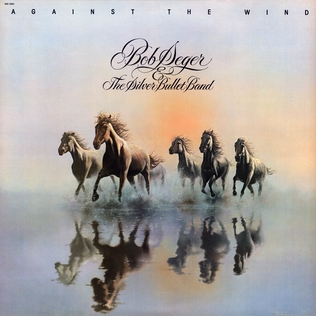
Against the Wind is the eleventh studio album by American rock singer Bob Seger and his fourth which credits the Silver Bullet Band. Like many of his albums, about half of the tracks feature the Muscle Shoals Rhythm Section as backing musicians. It was released in February 1980. It is Seger's only number-one album to date, spending six weeks at the top of the Billboard Top LPs chart, knocking Pink Floyd's The Wall from the top spot. Seger said that the album "is about trying to move ahead, keeping your sanity and integrity at the same time."
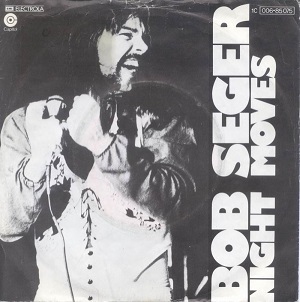
"Night Moves" is a song by American singer-songwriter Bob Seger. It was the lead single from his ninth studio album of the same name (1976), which was released on Capitol Records. Seger wrote the song as a coming of age tale about adolescent love and adult memory of it. It was based on Seger's own teenage love affair he experienced in the early 1960s. It took him six months to write and was recorded quickly at Nimbus Nine Studios in Toronto, Ontario, with producer Jack Richardson. As much of Seger's Silver Bullet Band had returned home by this point, the song was recorded with several local session musicians.

"Against the Wind" is a song written and recorded by the American singer-songwriter Bob Seger for his eleventh studio album of the same name. It was released as the second single from the album in April 1980 through Capitol Records. Seger recorded the ballad during a two-year process that begat his eleventh album; it was recorded with producer Bill Szymczyk at Criteria Studios in north Miami, Florida. Sonically, "Against the Wind" is a mid-tempo soft rock tune with piano backing. It was recorded with Seger's Silver Bullet Band, and features backing vocals from Eagles co-frontman Glenn Frey.
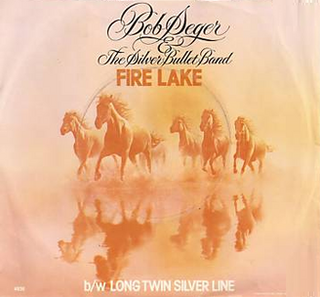
"Fire Lake" is a song written and recorded by the American musical artist Bob Seger. He had planned to record "Fire Lake" for his 1975 album Beautiful Loser, but the track was not finished. The song had been partly written years before, in 1971, and was finally finished in 1979 and released in 1980 on Seger's album Against the Wind. The single reached number 6 on the Billboard Hot 100. A live version of the song appeared on the album Nine Tonight, released in 1981.

"Old Time Rock and Roll" is a song written by George Jackson and Thomas E. Jones III, with uncredited lyrics by Bob Seger. It was recorded by Seger for his tenth studio album Stranger in Town. It was also released as a single in 1979. It is a sentimentalized look back at the music of the original rock 'n' roll era and has often been referenced as Seger's favorite song. The song gained renewed popularity after being featured in the 1983 film Risky Business. It has since become a standard in popular music and was ranked number two on the Amusement & Music Operators Association's survey of the Top 40 Jukebox Singles of All Time in 1996. It was also listed as one of the Songs of the Century in 2001 and ranked No. 100 in the American Film Institute's 100 Years...100 Songs poll in 2004 of the top songs in American cinema.

"Heartache Tonight" is a song written by Don Henley, Glenn Frey, Bob Seger and J. D. Souther, recorded by the Eagles and features Glenn Frey on lead vocals. The track was included on their album The Long Run and released as a single in 1979. It reached No. 1 on the U.S. Billboard Hot 100 in November of that year and was certified Platinum by the Recording Industry Association of America representing one million copies sold. It was the Eagles' final chart-topping song on the Hot 100.

"Shame on the Moon" is a song written by Rodney Crowell and first recorded in 1981. It was covered by Bob Seger & the Silver Bullet Band as the lead single from their 1982 album The Distance.

"Roll Me Away" is a song written by American rock artist Bob Seger on the album The Distance by Bob Seger and the Silver Bullet Band. The song was used as Seger's opening song on his Face the Promise tour in 2006–2007, his first tour in a decade.
The discography of Bob Seger, an American rock artist, includes 18 studio albums, two live albums, five compilation albums and more than 60 singles. Bob Seger's albums have sold over 50 million copies and received seven multi-platinum, four Platinum and two Gold certifications by the RIAA.

"You'll Accomp'ny Me" is a song written and recorded by American rock singer Bob Seger. It appears on his album Against the Wind.

"Mainstreet" is a song written and recorded by Bob Seger & The Silver Bullet Band. It was released in April 1977 as the second single from the album Night Moves. The song peaked at number 24 on the U.S. Billboard Hot 100 and has become a staple of classic rock radio; it also reached number one on the Canadian Singles Chart.

"Mississippi", is a song written by Charlie Daniels and first released on the Charlie Daniels Band's 1979 album Million Mile Reflections. It was also released as a single in September 1979 as the follow-up to "The Devil Went Down to Georgia." It reached the top 20 on the country singles charts in both the U.S. and Canada.
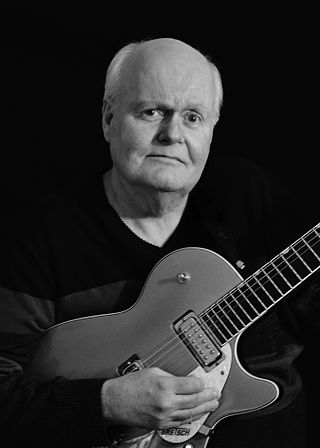
Jesse Willard "Pete" Carr was an American guitarist. Carr contributed to successful recordings by Joan Baez, Luther Ingram, Bob Seger, Paul Simon, Willie Nelson, Joe Cocker, Boz Scaggs, Percy Sledge, The Staple Singers, Rod Stewart, Barbra Streisand, Wilson Pickett, Hank Williams, Jr., and many others, from the 1970s onward.

"Still the Same" is a 1978 song written and recorded by the American singer Bob Seger. It hit #4 on the U.S. Billboard Hot 100 chart and was an international hit.

I Knew You When is the eighteenth and final studio album by American rock singer-songwriter Bob Seger. It was released on November 17, 2017.

"Her Strut" is a song written by Bob Seger that was first released on his 1980 album Against the Wind. It was also released as the B-side of his single "The Horizontal Bop." The song was inspired by feminist icon Jane Fonda.

"Even Now" is a song written by Bob Seger that was first released on his 1982 album The Distance. It was also released as a single, backed with "Little Victories,". It reached #9 on the Cash Box Top 100 chart and #12 on the Billboard Hot 100 as well as a lofty #2 on the Mainstream Rock chart.
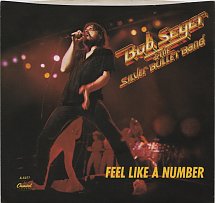
"Feel Like a Number" is a song written by Bob Seger that was first released on his 1978 album with the Silver Bullet Band, Stranger in Town. It was also released as the B-side of the top 5 single "Still the Same" and a live version from the album Nine Tonight was released as a single in 1981. The song was featured in the 1981 movie Body Heat.



















